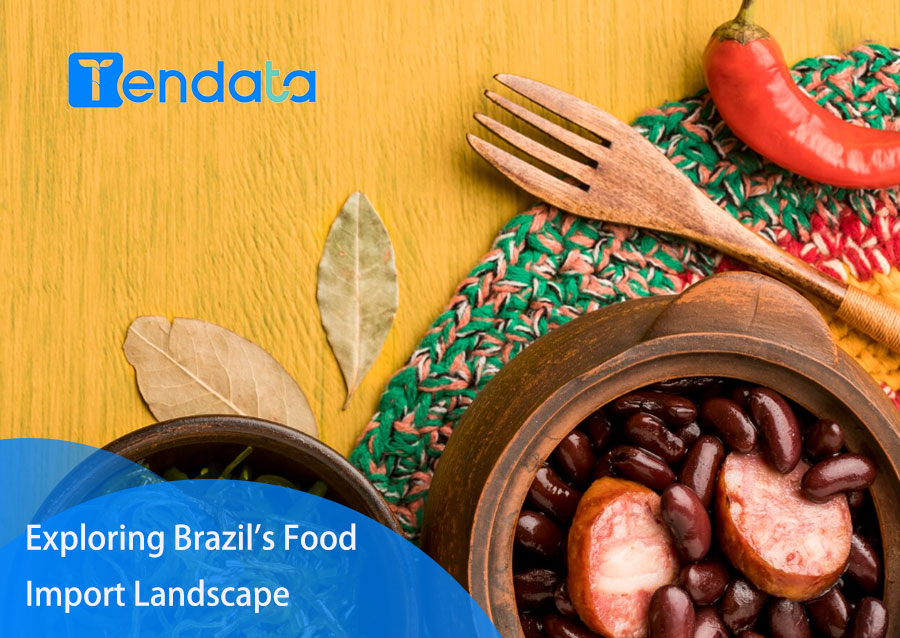 Import News
Import News
 09-11-2023
09-11-2023
Brazil, known for its diverse cuisine and rich agricultural heritage, has a thriving food industry. While the country is a significant global exporter of various food products, it also engages in food imports in Brazil to meet its domestic demand for specific goods and diversify its culinary offerings. In this article, Tendata will delve into the realm of Brazilian food imports, exploring the types of food products the country brings in, the reasons behind these imports in Brazil, and the evolving trends in this sector.

An Overview of Brazil's Food Imports
Brazil's food import market is characterized by a wide range of products that complement its local cuisine and cater to the demands of its diverse population.
Key Food Imports in Brazil
Brazil's food imports can be categorized into several groups:
· Grains and Cereals: Brazil imports grains like wheat and barley to support its baking industry and meet the demand for bread and pasta.
· Dairy Products: Imported Brazilian food products such as cheeses, milk, and butter augment the variety of dairy offerings in Brazil.
· Meat and Poultry: Brazil imports meat and poultry products like beef, chicken, and pork to meet the demand for specific cuts and processed meat products.
· Processed Foods: A variety of processed foods, including sauces, condiments, and ready-made meals, are imported to Brazil to diversify the country's food options.
· Beverages: Brazilian food imports include imported beverages, including wine, beer, and spirits, catering to Brazil's growing taste for international drinks.
Factors Driving Brazil's Food Imports
Several factors contribute to Brazil's food imports:
· Consumer Preferences: Importing to Brazil allows the country to offer a broader range of food products to meet the preferences of its multicultural population.
· Quality and Variety: Imported foods often provide a higher quality or variety not readily available domestically.
· Global Cuisine Influence: As Brazilians become more cosmopolitan, there is a growing interest in international cuisines, driving the import of specific ingredients and food products to Brazil.
· Market Demand: To maintain a consistent supply of certain foods year-round, Brazil relies on food imports.
Trends in Brazil's Food Imports
The landscape of food imports in Brazil is evolving. Some notable trends include:
· Health-Conscious Choices: There is a growing demand for health-conscious food options, leading to increased Brazilian food imports of organic and specialty health foods.
· Sustainable Sourcing: Brazilian consumers are becoming more aware of sustainability issues, which has led to an interest in imported Brazilian food products with environmentally friendly certifications.
· Regional Cuisine Influence: Food imports to Brazil are influenced by the popularity of specific international cuisines, such as Japanese, Italian, and Middle Eastern, leading to increased imports of ingredients used in these cuisines.
· E-Commerce Growth: Online shopping and e-commerce platforms have made it easier for Brazilians to access Brazilian food imports.
Conclusion
Brazil's food import market plays a vital role in the country's culinary diversity and consumer preferences. While Brazil is a significant food exporter, it recognizes the importance of importing specific food products to Brazil to meet market demand and cater to its diverse population. Understanding the dynamics of food imports in Brazil is essential for businesses looking to tap into this vibrant and evolving market, where consumer preferences, health consciousness, and sustainability considerations are driving changes in the Brazilian food import landscape.
Category
Leave Message for Demo Request or Questions


 T-info
T-info T-discovery
T-discovery

 My
Tendata
My
Tendata Market Analysis
Market Analysis Customer
Development
Customer
Development Competitor
Monitoring
Competitor
Monitoring Customer Relationship
Customer Relationship





































































































































